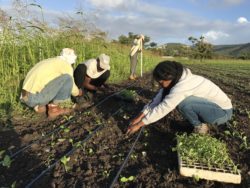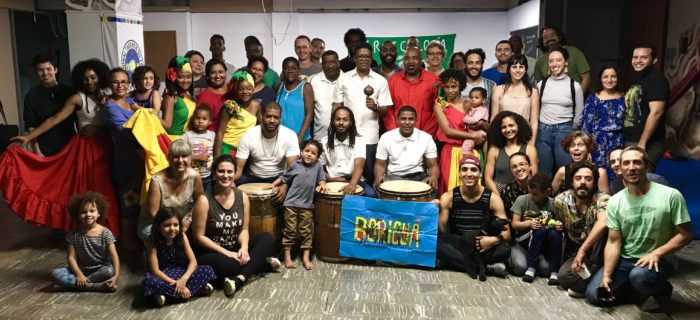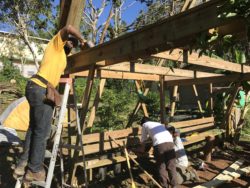Puerto Rican EcoFarms after María: Bouncing Back with a Little Help from our Friends
As a follow-up to a previous post showcasing the vulnerability that Puerto Rican farmers face in the context of climate crises, we want to highlight some of the decentralized mutual recovery work that has been unfolding across the agroecological web in Puerto Rico. Not only have we developed a transformed and strengthened sense of community but we are bouncing back after Hurricanes Irma and María, with the support from friends in Puerto Rico, North America, Latin America and elsewhere. Folks from several base groups that work with food sovereignty struggles and environmental justice have recently traveled to the Caribbean to support the re-construction of post-disaster farming and food systems along with local stakeholders.
Disasters are not ‘natural.’ These occur after natural hazards (i.e. hurricanes, droughts, earthquakes) hit an already vulnerable population that has little or no capacity to adapt after the event has passed. Hurricane María hit the Caribbean so strongly that the vegetation went from lush green to dark brown in a matter of hours. As the natural vegetation becomes green and renewed, the political will of Puerto Rican and US governments seems to be focused on continuing to keep us highly dependent on fossil fuel and aid of all kinds. Today (almost six months after), 20% of the grid is still without electricity and there is no plan of turning towards solar or wind alternatives. Moreover, the privatization of our electric service and education system is a cynical move on behalf of Puerto Rico’s government which opens the way for an almost entirely privatized reconstruction process. Given Puerto Rico’s lack of sovereignty, it is an intensified example of the ‘disaster capitalism’ that Naomi Klein warned us about, which has unfolded in places like Haiti, New Orleans and Indonesia.
Rescuing our farming systems is crucial for laying the foundation towards a more self-sufficient and adaptable future. Whereas we used to import 85% of our food items, after María this number increased to between 95% and 98%. In response, the ReGrow Fund was established to support farmer recovery and, within two weeks, agroecological farmer’s markets across the main island reopened to allow farmers to sell resisting crops and generate some income. These provided a temporary sense of normalcy to the crisis, and have continued to function as important meeting spaces.
A steady shift towards more sustainable agricultural practices and integrated ways of living has been brewing for over  thirty years in Puerto Rico, despite the government’s will to fully ignore these efforts. During the last decade, however, there has been a formative boom in the amount of small-scale agroecological farms, which have popped up in nearly all towns of our archipelago. Trained youth from rural and urban communities are motivated to lift the country to develop autonomous farms, while already-established farmers are showing greater interest in transitioning to more sustainable practices. Simultaneously, self-organized community-support centers (Centros de Apoyo Mutuo) were spontaneously created and continue to serve food, emotional support, and technological alternatives in several localities that suffered from the hazard, particularly in rural areas. They also served as important channels of distribution for other community groups and organizations that worked to import essential materials (e.g. water filters, solar energy items, organic seeds) to support farmers and their communities.
thirty years in Puerto Rico, despite the government’s will to fully ignore these efforts. During the last decade, however, there has been a formative boom in the amount of small-scale agroecological farms, which have popped up in nearly all towns of our archipelago. Trained youth from rural and urban communities are motivated to lift the country to develop autonomous farms, while already-established farmers are showing greater interest in transitioning to more sustainable practices. Simultaneously, self-organized community-support centers (Centros de Apoyo Mutuo) were spontaneously created and continue to serve food, emotional support, and technological alternatives in several localities that suffered from the hazard, particularly in rural areas. They also served as important channels of distribution for other community groups and organizations that worked to import essential materials (e.g. water filters, solar energy items, organic seeds) to support farmers and their communities.
Due to the state government’s almost complete absence of support towards ecological farming, farmers, farm workers, and food sovereignty activists have learned to persist and recover against all odds. Agroecological and multiregional base group Organización Boricuá de Agricultura Ecológica de Puerto Rico, along with Black Dirt Farm Collective, La Vía Campesina, and the Climate Justice Alliance, recently organized a month-long series of mutual support brigades, Brigadas de Apoyo: Agroecología, Reconstrucción y Justicia Climática, in Orocovis, Naranjito, Vieques and St. Croix. While at the same time the Guagua Solidaria kicked-off its own seed, reforestation, and farmer brigades in urban and rural agroecological projects, targeting the first few farms of two hundred they will support throughout the next two years. These campaigns were organized with people from all over Puerto Rico, and from representatives of social justice and farming collectives from Eastern and Western US states, Canada, Central America, and Europe.
These brigades followed months of impromptu, voluntary immediate relief brigades in which members of these organizations engaged to support farmers and their communities. Organización Boricuá’s brigades were held in the format of moving camps, spending 3-4 days in each farm rebuilding farming structures, houses and planting. These brigades incorporated spaces for political training, dialogues, workshops, cultural exchanges and reflection while promoting active group participation during the process. Exchanges like these not only help farmers get stabilized and better positioned to confront the next hurricane season(s), but also help bolster the movement work of organizers, educators, activists and farmers that often spills over beyond a farm’s perimeters into diverse communities and across many issues.
Stay in the loop with Food First!
Get our independent analysis, research, and other publications you care about to your inbox for free!
Sign up today!Historical and personal connections run deep between grassroots groups and social movements in the US, Latin America and the Caribbean due to the shared history of colonialism, occupation, and slavery that characterizes the Caribbean region and the development of the global agricultural sector. The group’s efforts served to strengthen relationships and knowledge exchange between farms as a regional resiliency strategy that embraces the campesino-a-campesino methodology and combats the physical, social, and emotional isolation that can characterize reconstruction and recovery. The brigades serve to not only speed up production preparations and infrastructure reconstruction, but to re-energize farmers and those who support them to continue the work that is now more urgent than ever.
It was important for the collectives to extend this solidarity work to St. Croix, a Caribbean sister island and a US Virgin Island that was devastated by Hurricanes Irma and María, but received much less coverage than Puerto Rico. For the last leg of the trip, the group spent five days at Sejah Farm owned and operated by Dale Browne and Yvette Browne, Chair of the Southeastern African American Farmers’ Organic Network (SAAFON). Established in 1998, the farm spans fifteen acres consisting of eleven acres for grazing sheep and goats, three acres for vegetable crop production, and three-quarter acres for poultry production. The group worked throughout five days rebuilding and replacing fencing; building a new, hurricane-proof nursery-ranch with new and recycled materials from the farm; and weeding, tilling, and planting three fields to kick-start vegetable production. This experience also opened a space for exchanging knowledge between farmers in the Caribbean and created strong relationships for years to come.
Given the impact of the 2017 hurricane season on the Caribbean, it is now more important than ever for small-scale farmers and food sovereignty activists to have the opportunities to learn from and support each other across local and coastal boundaries. People in the Caribbean are at the frontlines of climate change in countries where the devastating impacts are being felt first. Our vulnerability to climate crises is shared and we have a common responsibility to help farmers strengthen agroecological practices, expand their web of supports, and mobilize communities to demand a just transition away from crises towards sustainable living conditions.
About the authors: Hortencia Rodríguez is a master’s student in Public Policy and International & Area Studies at the University of California, Berkeley, USA. Georges Félix is a PhD candidate in Farming Systems Ecology at Wageningen University, The Netherlands. Jesús Vázquez studied Communication, Humanities and Law in the University of Puerto Rico. He is part of the National Coordination of Organización Boricuá de Agricultura Ecológica de Puerto Rico, CLOC-Vía Campesina Chapter and is a member of the National Association of Environmental Law. All are Puerto Rican.



 Help Food First to continue growing an informed, transformative, and flourishing food movement.
Help Food First to continue growing an informed, transformative, and flourishing food movement.




